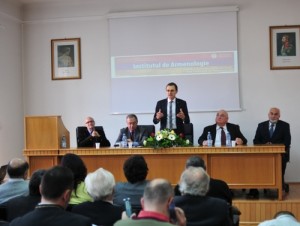Institute of Armenian Studies opens in Romania

The official opening ceremony of the Institute of Armenian Studies was held at Babeș-Bolyai University in the Romanian city of Cluj-Napoca on November 7. Among the participants were Rector of the University, academic Ioan-Aurel Pop; Director of the Institute of Armenian Studies, Doctor, Professor Luchian Nastase-Kovach; Rector of Yerevan State University Aram Simonyan; RA Ambassador to Romania Hamlet Gasparyan; President of the State Council of Cluj Ishtvan Vakar; President of the Union of Armenians of Romania, Senator Varujan Vosganian; Archbishop Alba Yulia; Apostolic Prelate of the Catholic Armenians of Romania Giorgi Yakubin; Director of the Center for Studies on the History of Jews in Romania, Dr. Liviu Rotman; the mayors of the Armenian-populated cities of Gerla and Dumbraven; members of the Romanian Academy, as well as intellectuals, students and professors.
As reported by the RA MFA press service to “Hayern Aysor”, the Institute of Armenian Studies is the first in Central and Eastern Europe and was established under the initiative of the director of the Institute, Head of the School for Doctors in Studies on International Relations and Security Issues at the University Luchian Nastase-Kovach and the Armenian Embassy in Romania and with the support of the Union of Armenians of Romania.
According to Nastase-Kovach, “the establishment of the Institute of Armenian Studies is not only an important step in the studies on the Armenian communities of Central and Eastern Europe, but also very urgent, taking into consideration the 100th anniversary of the Armenian Genocide-an event that has had a huge impact on all Armenians around the world”.
Ambassador Hamlet Gasparyan presented the efforts that have been made at the interstate level and have spared Romanians’ interest in Armenian studies and voiced hope that, in addition to academic interest in the longtime presence of Armenians in the Balkans and neighboring countries, the activities of the Institute of Armenian Studies will also help reveal the Armenian element among the diverse cultures in modern-day Europe and will enrich the Armenian identity, making it easier for the new generations to recognize and understand each other.
“I believe the Institute of Armenian Studies may become an open platform for discussions on the reasons and devastating consequences of the Armenian Genocide in the context of the 100th anniversary of WWI and especially in the context of the Centennial of the Armenian Genocide. They are consequences that have had a huge impact on the destinies of Armenians, the Armenian identity conditioned by heavy losses and wounds that still haven’t healed and because of which Armenia and the Armenian Diaspora now face the most difficult challenges,” Ambassador Gasparyan mentioned.
“The establishment of the first Institute of Armenian Studies in Romania, as well as in Central and Eastern Europe is one of the major events of Babeș-Bolyai University. We take pride in the fact that Armenian culture and civilization have served as a model for the Romanians, Hungarians and Germans. The new institute serves as an important and necessary step in the studies on Armenian communities of Central and Eastern Europe, and there is a need for studies on not only the past, but also the present and future,” Rector Ioan-Aurel Pop underlined.
YSU Rector Aram Simonyan praised the establishment of the Institute of Armenian Studies and mentioned that the YSU would do everything possible to support the activities of the Institute. President of the Union of Armenians of Romania, Senator Varujan Vosganian and President of the State Council of Cluj Ishtvan Vakar also attached importance and expressed their support to the Institute of Armenian Studies. Prelate of the Armenian Diocese of Romania, Bishop Tatev Hakobyan had also conveyed a message on the occasion of the opening of the Institute of Armenian Studies.
The opening ceremony was preceded by the meeting of Ioan-Aurel Pop and Aram Simonyan during which the sides agreed to sign agreements on cooperation between the universities of Cluj and Yerevan, as well as between the Institutes of Armenian Studies of both universities.
In addition to being established within the Babes-Bolyai University of Cluj, the Institute of Armenian Studies will also be in Gerla (former Armenopolis) where the YSU delegation and the guests of the event visited the following day.
Romanian presses and television stations provided wide coverage of the opening ceremony.
The Babes-Bolyai University is considered one of the large and prestigious universities of Romania. The University is interesting due to the rich Armenian historical and cultural heritage in Transylvania. Armenians settled here in the late 17th century. They established settlements and have made great contributions to economic development, have fostered crafts and trade and have helped raise the level of culture and education in those areas. There are rich materials devoted to that in the local archives, scientific and educational institutions, museums and in the archives of Armenian Catholic Churches, and historical and scientific research has been done and is being done in Hungarian and Romanian. Those efforts will become more programmatic and goal-oriented with the establishment of the Institute of Armenian Institute.




 Արևելահայերեն
Արևելահայերեն Արևմտահայերեն
Արևմտահայերեն Русский
Русский






